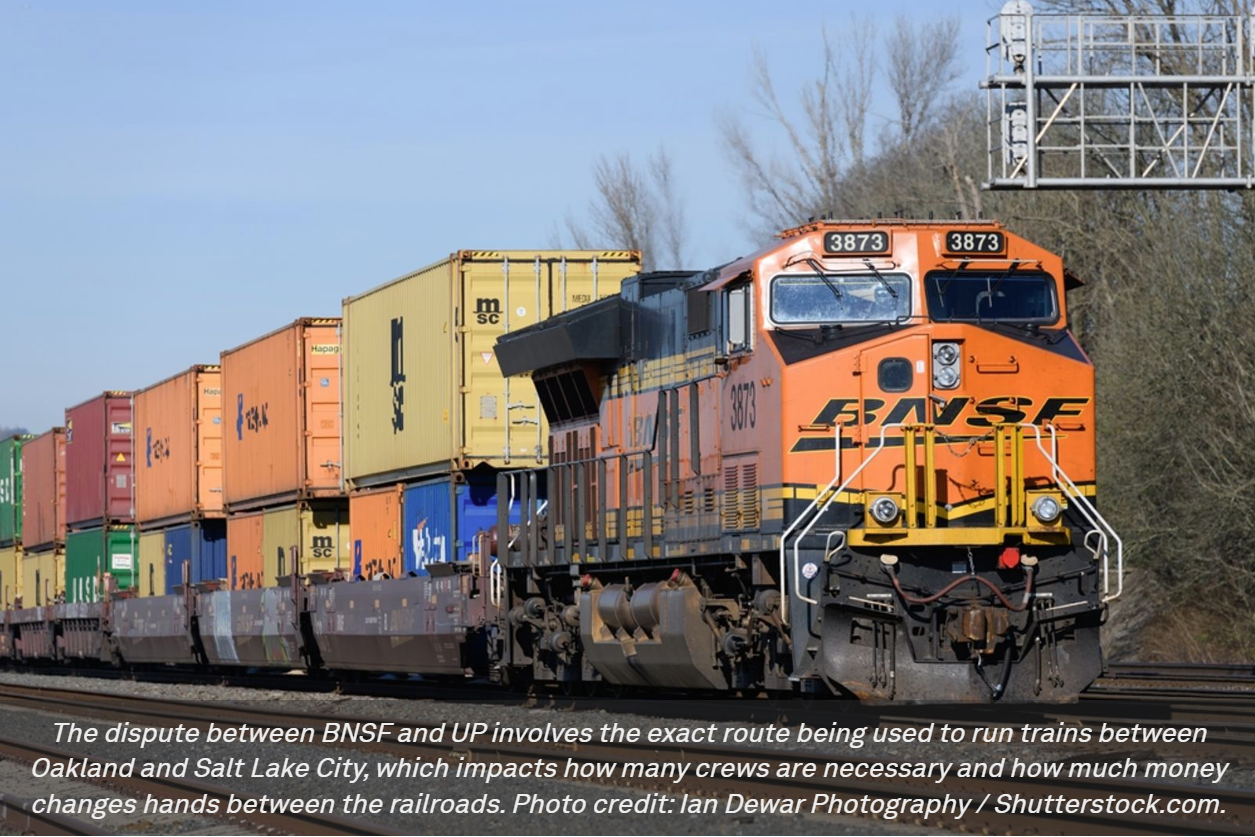
BNSF Railway has filed an emergency petition with the US Surface Transportation Board (STB) to intervene in a dispute with Union Pacific Railroad (UP) in which BNSF alleges UP is blocking the launch of a new freight service between the Port of Oakland and Salt Lake City.
The impasse threatens supply chain disruptions for ocean carrier CMA CGM, which has cargo booked on the service that is due to begin later this week.
The disagreement involves how BNSF will route trains between Oakland and Salt Lake City. BNSF wants to run a double-stack intermodal service along the so-called Northern Route, which passes through Northern California and Nevada. UP said BNSF must instead use the Southern Route over Donner Pass near Lake Tahoe, where UP invested in costly tunnel upgrades more than a decade ago.
The route selected has financial implications for both Class I railroads, including how many train crews are needed and whether BNSF would owe Union Pacific millions of dollars for using the upgraded Southern Route.
BNSF has the right to use UP-owned tracks between Oakland and Salt Lake City. However, UP controls dispatching and provides train crews, and without its cooperation, BNSF cannot move containers across the corridor.
The dispute, meanwhile, threatens the launch of an international intermodal service scheduled for later this week. CMA CGM called the matter“deeply concerning”and costly for cargo owners.
“Without immediate resolution, our supply chain will be disrupted, impacting our customers across the region, including potentially a loss of business,”Bob Basila, senior vice president of CMA CGM, wrote in a filing to the STB Monday.“We have made substantial operational and commercial commitments based on the availability of this service, and the current impasse threatens to undermine those investments.”
BNSF said emergency relief is necessary given freight has already arrived in Oakland.
“The first empty train arrived in Salt Lake City [July 6] and the first container arrived [July 7],” BNSF wrote Monday in its petition to the STB. “Once loaded, the first westbound train is expected to leave Salt Lake City this week. BNSF anticipates the first eastbound movement of BNSF double-stack intermodal trains over the Northern Route will begin as early as later this week.”
There is potential for business growth in Salt Lake City for ocean carriers. In 2020, ocean carriers handled nearly 52,000 TEUs between Oakland and Salt Lake City, according to PIERS, a sister product of the Journal of Commerce within S&P Global. The total, however, has fallen each subsequent year, ending last year at 16,600 TEUs.
If ocean carriers were able to return to the 2020 total, it would be enough volume to support multiple trains per week in both directions, although it's unlikely there would be daily trains.
Allegations fly in both directions
BNSF told the STB it would prefer to use the Northern Route and claimed UP is employing delay tactics in retaliation for BNSF signing multi-year agreements with two former UP ocean carrier partners, including CMA CGM.
UP alleges that BNSF did not provide sufficient prior notice to hire crews and plan resources to handle up to five trains per week in both directions between Oakland and Salt Lake City and requires more time to prepare. Carl Garrison, UP's vice president of network planning and operations, said BNSF only notified UP senior staff of its needs on June 20.
BNSF countered that it contacted UP on May 2, including written correspondence and follow-up phone calls.
“If BNSF cannot fulfill its promises to begin running new intermodal service this week, it has only itself to blame,”UP wrote in its response Monday to the STB.
UP also said trains on the Northern Route primarily run westbound, so running a bi-directional service would require significant operational adjustments and could degrade the performance of existing trains. It added that the Southern Route is best equipped to handle bi-directional traffic.
The Southern Route was upgraded in 2009 to accommodate double-stack intermodal trains. If BNSF uses it, the company could be required to reimburse UP for up to half the cost of those improvements. BNSF argues doing so would cost tens of millions of dollars, making the new service financially unsustainable.
BNSF would only need to pay for crew services, dispatching and track access on the Northern Route, a much lower figure.
UP also said the matter should go through the normal STB dispute process, not an emergency filing. The normal dispute resolution process outlined in a 2002 agreement includes meetings, executive escalation, and potential arbitration or mediation, which can take far longer to resolve.

